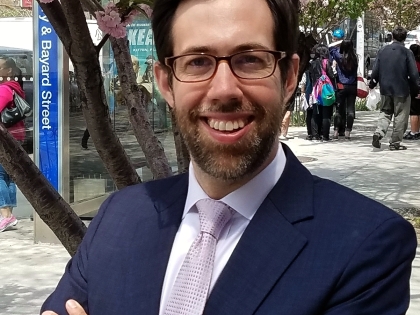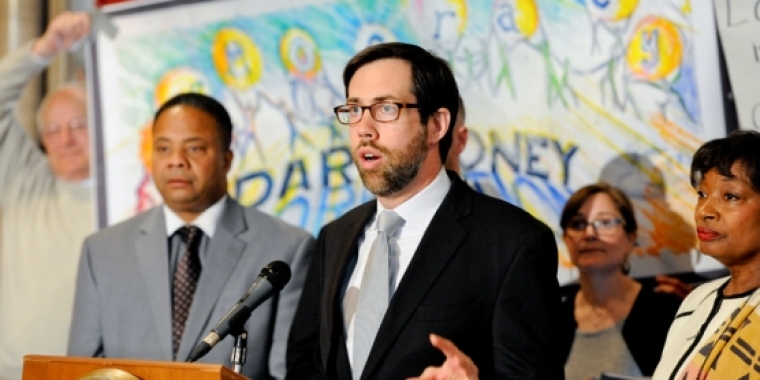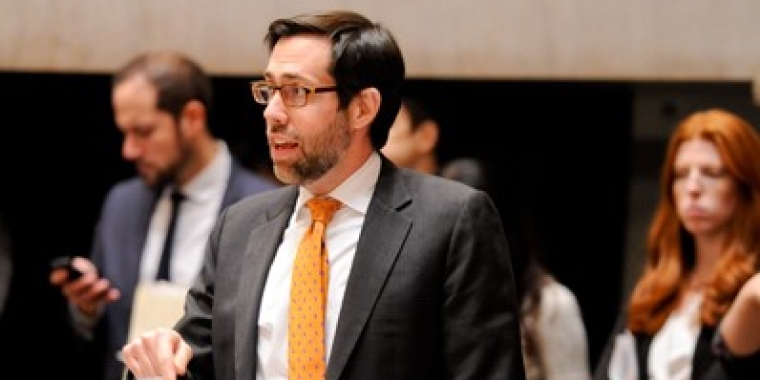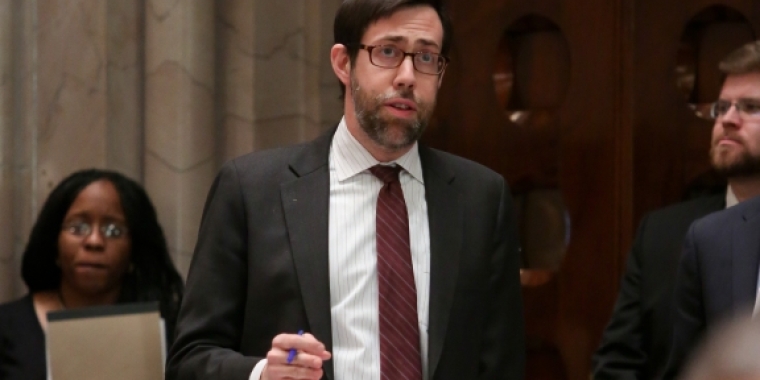
Squadron Comments to Battery Park City Authority Board

BATTERY PARK CITY - Today, State Senator Daniel Squadron urged the Battery Park City Authority Board at their July board meeting to allow direct public comment. Squadron’s comments, as prepared, are below:
PREPARED COMMENTS OF STATE SENATOR DANIEL SQUADRON TO THE BATTERY PARK CITY AUTHORITY BOARD
Thank you to Chair Mehiel, the Battery Park City Authority Board, and President Hyman for allowing me to speak today.
In April, I wrote a letter calling on the Board to allow public comment at board meetings like today’s, joined by Congressman Jerrold Nadler, Manhattan Borough President Gale Brewer, Assemblymember Deborah Glick and City Councilmember Margaret Chin.
I wrote this letter because hearing directly from residents during board meetings is one important way to break the ongoing cycle of Board decisions, followed by public outcry, followed by the promise of better communication from the Board.
In response to the letter, the Board discussed the matter of public comment at its last meeting on June 8th. The “solution,” -- restricting local residents to submit written comments for the minutes and allowing elected officials to speak on their behalf -- is woefully inadequate. As I have said before, this was never about elected officials’ opportunity to be heard -- we have many opportunities to be heard.
In light of the fact that the Board is comprised primarily of members who do not reside in Battery Park City, it is especially important that local residents be allowed to share their local perspective directly with the Board at these meetings.
Since residents are not allowed to speak, I would like to take this opportunity to speak for them. Here is a sample of what residents would like to tell the Board had they been given the opportunity to speak.
- “Both the financial structure that will make this community affordable for decades to come and the physical infrastructure that will protect it from flood waters and rising sea levels are crucial questions that speak directly to the continued survival and success of Battery Park City. And the people that live and work here must be part of the dialogue and decision-making process from the earliest stages (before consultants are awarded contracts, for example), not at the end of the process or after the fact.”
- “The BPCA should acknowledge their constituent’s needs for fair housing: housing that would allow their constituents to best remain in place instead of housing that simply favors outside owner/operators.”
- “If the new mandate of the BPCA to focus on the needs of tourism for New Yorkers and visitors, how does that balance with the needs of the existing residential and small business community?”
- “I believe that no significant changes to infrastructure or policy should be made without a lengthy period of public comment that must include multiple opportunities for the Authority to hear from its constituents and act upon the opinions expressed at such forums.”
- “In a time of increased transparency and open government, the barrier for taxpayers to speak at a public forum is contrary to our democratic process.
These are the kinds of comments public bodies across the state, both large and small, hear at their meetings. For example:
- The Metropolitan Transportation Authority allows the public to register 30 minutes before any board meeting to speak for up to 2 minutes on any agenda item.
- The Port Authority of New York and New Jersey allows each speaker up to 3 minutes, with a public comment period of at least 30 minutes.
- The Roosevelt Island Operating Commission allows public comment before the start of board meetings.
- The Empire State Development Corporation (ESDC) allows for public comment on each agenda item before it is voted on. Each member of the public is given 2 minutes to speak, and group/organization representatives are given 4 minutes to speak.
- The Lower Manhattan Development Corporation is a subsidiary of the Empire State Development Corporation and follows the same rules as ESDC.
- The New York State Thruway Authority allows for two public comment periods. The first, before the board meeting, allows speakers 2 minutes to address items on the agenda. The second, after the board meeting, allows speakers up to 2 minutes of general comment, and is limited to 15 minutes.
- The Agriculture and New York State Horse Breeding Development Fund allows up to 5 minutes of public comment per speaker.
- The Albany Convention Center Authority allows 3 to 5 minutes of public comment per speaker, up to 30 minutes total.
- The Green Island Power Authority allows each speaker up to 5 minutes of public comment.
- The Saratoga Springs City Center Authority allows the public to speak for up to 2 minutes for “brief and direct statements, presentations, and comments.”
- The Long Island Power Authority allows the public an opportunity to comment before each agenda item is voted on.
- Additionally, the Southern Tier Railroad Extension Authority, the Hudson River-Black River Regulating District, the Nassau Health Care Corporation, the Ogdensburg Bridge Authority, and the Schenectady Metroplex Development Authority allow the public to speak to the board at meetings.
There are also local City-controlled boards that allow time for public comment at their board meetings.
- The Trust for Governor's Island allows public comment after the agenda is complete.
- The Brooklyn Bridge Park Corporation allows public comment immediately before the beginning of the Board’s executive session.
- In addition, given the Battery Park City Authority’s unique role in local governance, I want to highlight the public comment policies of a number of local governments throughout the state.
- The New York City Council allows the public to provide testimony at every hearing. Since no bill can be voted on without a public hearing, the public’s opinion can be heard on every bill.
- The Nassau County Legislature allows up to 3 minutes of public comment per speaker on any item on the agenda.
- The Schuyler County Legislature represents the second smallest county in NYS, with a population that is close to the size of Battery Park City. It allows up to 30 minutes of public comment at the beginning of meetings and up to 15 minutes of public comment at the completion of the agenda.
- The Niagara Falls City Council allows speakers up to 5 minutes of public comment. The chair has the discretion to both limit the number of speakers if it’s likely to delay proceedings or extend any speaker’s time for an additional 2 minutes.
These 22 government bodies represent constituencies and issues very large and very small. The thing they have in common is that, unlike the Battery Park City Authority, they allow the public to directly address their members. The operations of these organizations are not diminished by greater public participation; they are enhanced.
I strongly urge the Board to follow these examples, reconsider its previous decision, and allow the public the opportunity to directly address the Board at Authority meetings.
###



